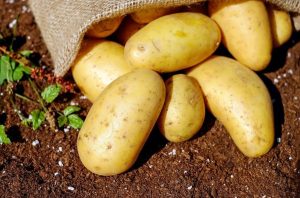Gains in Potato Yields with Humic and Fulvic Acid
The aim of the study was to determine the effect of seaweed extracts and humic acid application on plant growth and marketable tuber yield of very early potato cultivars.
Study highlights:
 Biostimulants contain a wide range of bioactive compounds that increase plant stress resistance, which allows better use of the cultivar production potential under the environmental conditions of the cultivar area. In field crop production, the most commonly used are seaweed extracts and humic acids. These compounds affect cellular metabolism in treated plants, leading to increased tolerance to abiotic stresses, improved plant growth and crop yield
Biostimulants contain a wide range of bioactive compounds that increase plant stress resistance, which allows better use of the cultivar production potential under the environmental conditions of the cultivar area. In field crop production, the most commonly used are seaweed extracts and humic acids. These compounds affect cellular metabolism in treated plants, leading to increased tolerance to abiotic stresses, improved plant growth and crop yield
The yield-increasing effect of biostimulants depended on hydrothermal conditions during potato growth. Seaweed extracts produced better results in a warm and a very wet growing season, whereas humic and fulvic acids produced better results in a cool growing season with drought during the tuber growth period.
Humic substances are able to produce positive effect on the growth, yield and quality of potato. The biostimulant effects of humic substances extracted from naturally humified organic matter, from composts, or from mineral deposition are characterized by both structural and physiological changes in plants.
A strong potato response to the application of humic substances originating from leonardite formations in Canada has been reported. Later studies carried out in Poland, Saudi Arabia and China confirmed the positive effect of humic and fulvic acids on potato growth and on tuber yield and quality.
Humic and fulvic acids from leonardite produced better results in a cool growing season and with insufficient water supply for plants in a period of tuber growth. With the use of HumiPlant the marketable tuber yield was higher by 12%.

